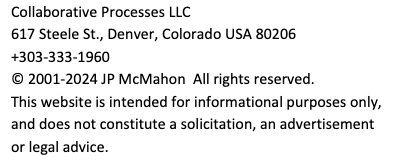Improving collaborative processes
On some occasions, a collaborative process is underway – but under functioning. We can assist the participants in improving the processes by assessing the ongoing process and proposing training, capacity building or process adjustments to improve the process. Collaborative Processes has developed a tool to periodically assess the health and function of collaborative processes. Similar to assessments, our efforts to improve existing processes usually begin with interviews with participants – leading to recommended changes or programs.
Collaboration is of great value but challenging: it has a cycle of collaboration, conflict and then adaptation.
Where collaboration fails
Based on a survey of experienced facilitators and a training session, we have developed the following list of the most common triggers for collaborative group failure:
Failure triggers – Parties
1. Polarized parties, often with a long conflict history. A need to build trust
2. Lack of collaborative leadership or direction.
3. Dysfunctional parties.
4. Parties who seek to undermine the process.
5. Low disclosure by some participants, hidden agendas.
Failure triggers – Collaborative process
6. The process pace is wrong; time too short for complex issues.
7. Problems with the decisional process or lack of clarity about desired outcome.
8. Unrealistic expectations (outcome and pace).
9. External pressure (from senior management or politics).
10. Lack of credible expertise to assess data.


